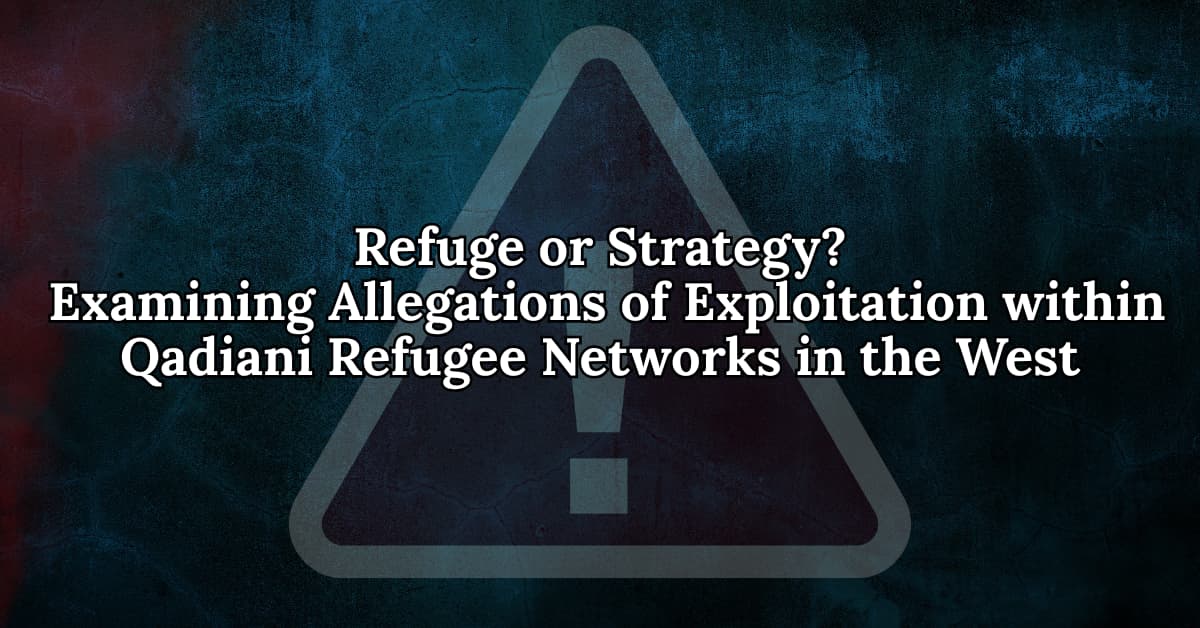Migration from East to West is often a journey of hope, a pursuit of safety, freedom, and a better future. Yet, for some Ahmadi (Qadiani) refugees, this journey has reportedly turned into an experience marked by exploitation, coercion, and unspoken suffering. Reports from Germany, the UK, Canada, and the United States suggest that, beyond the visible narrative of persecution, some Ahmadis face undue pressure and financial burdens from their own leadership and religious institutions.
These claims, supported by investigative journalism, personal testimonies, and academic studies, raise critical questions. Is it a community that presents itself as oppressed, silently oppressing its members? Or are these allegations part of a broader conspiracy? In an Era where religion, asylum, and power often intersect in anonymity, such questions demand closer scrutiny.
Key Allegations against Ahmadiyya Leadership
Financial Exploitation through Compulsory Donations (Chanda)
One of the most persistent allegations is the imposition of mandatory financial contributions on newly arrived refugees, regardless of their financial circumstances.
- Investigative Journalism
German outlets Report Mainz and Der Spiegel have documented cases where Ahmadi asylum seekers were subjected to intense pressure to pay donations. In some instances, public shaming was used to enforce compliance. - Academic Reference
Michael Nijhawan, in his book The Precarious Diasporas of Sikh and Ahmadiyya Generations, highlights testimonies from Ahmadi refugees who were made to feel unworthy or excluded if they failed to contribute financially.
Human Trafficking and Asylum Fraud
There are claims that some Qadiani leaders allegedly encourage refugees to fabricate stories of persecution or religious discrimination to secure asylum in Western countries.
- Trafficking Networks
Reports and rumours point to illicit networks operating between Pakistan and Germany, allegedly involved in forging documents and charging high fees to facilitate migration. In some instances, these activities border on organized human smuggling. - Legal Repercussions
German authorities have, in certain cases, uncovered financial fraud and have repatriated dozens of Ahmadi asylum seekers after investigations.
Social Control and the Threat of Exclusion
Some testimonies indicate that those who dissent, criticize leadership, or resist financial pressure are threatened with social isolation or even exclusion from the community.
- Nida Al-Nasir
A relative of the current Ahmadi spiritual leader, Nida Al-Nasir, accused the leadership of sexual abuse and claimed she was pressured to remain silent and threatened with exclusion.
Legal and Social Implications
In the UK, tribunals and legal forums have sometimes expressed concerns over the unverifiability of religious identity claims made by asylum seekers. In some cases, exaggerations or inconsistencies have led to application rejections and deportations. These issues have also triggered deeper investigations into the Qadiani leadership’s role in asylum narratives.
Responses from the Ahmadiyya Leadership
Official Stance
The Ahmadi leadership has categorically denied all such allegations, labelling them as slander or conspiracies. They continue to portray the community as a maltreated religious minority and assert their commitment to supporting vulnerable members, including asylum seekers.
Critical Perspectives
Critics argue that the leadership capitalizes on donations and asylum-driven migration to expand its institutional influence and secure international visibility.
Diverse Experiences
Not all Ahmadi refugees report abuse or coercion. Many genuinely find support, spiritual belonging, and safety within the community. These differing narratives highlight the complexity of the issue.
Conclusion
Every coin has two sides. Allegations of financial exploitation, social coercion, and asylum manipulation by Qadiani leadership are not limited to isolated complaints—they appear in journalistic investigations and academic literature. Yet, not every Ahmadi (Qadiani) refugee shares this experience. For many, the community remains a refuge of guidance and hope.
The truth lies somewhere between the silent voices of those afraid to speak and the loud claims of leadership defending its image. The responsibility now lies with journalism, legal institutions, and society to listen to those voices, ensure justice, and guarantee that no one (regardless of faith) is subjected to internal or external oppression.



